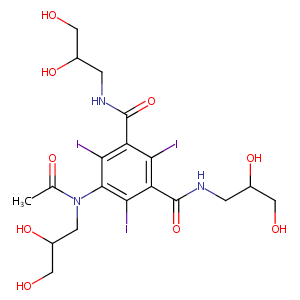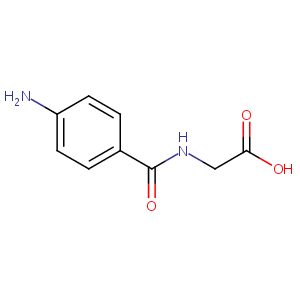| DOT Name |
DOT ID |
UniProt ID |
Mode of Action |
REF |
|
ABC-type organic anion transporter ABCA8 (ABCA8)
|
OTCWLX6N
|
ABCA8_HUMAN
|
Affects Transport
|
[15] |
|
Sodium-dependent phosphate transport protein 4 (SLC17A3)
|
OTMJWIBM
|
NPT4_HUMAN
|
Affects Transport
|
[18] |
|
Organic anion transporter 3 (SLC22A8)
|
OT8BY933
|
S22A8_HUMAN
|
Increases Uptake
|
[19] |
|
Aryl hydrocarbon receptor repressor (AHRR)
|
OTSJ12W6
|
AHRR_HUMAN
|
Decreases Expression
|
[20] |
|
Secretory carrier-associated membrane protein 3 (SCAMP3)
|
OTUNPYCE
|
SCAM3_HUMAN
|
Affects Expression
|
[5] |
|
Glutathione S-transferase A4 (GSTA4)
|
OTZ1USIA
|
GSTA4_HUMAN
|
Affects Expression
|
[21] |
|
C-X-C motif chemokine 13 (CXCL13)
|
OT2AT4N8
|
CXL13_HUMAN
|
Affects Expression
|
[5] |
|
Pre-mRNA-processing factor 17 (CDC40)
|
OTOYUNHN
|
PRP17_HUMAN
|
Affects Expression
|
[21] |
|
Glutathione reductase, mitochondrial (GSR)
|
OTM2TUYM
|
GSHR_HUMAN
|
Affects Expression
|
[21] |
|
Epidermal growth factor receptor (EGFR)
|
OTAPLO1S
|
EGFR_HUMAN
|
Increases Expression
|
[22] |
|
Tumor necrosis factor (TNF)
|
OT4IE164
|
TNFA_HUMAN
|
Increases Expression
|
[22] |
|
Interferon gamma (IFNG)
|
OTXG9JM7
|
IFNG_HUMAN
|
Increases Expression
|
[23] |
|
Interleukin-1 alpha (IL1A)
|
OTPSGILV
|
IL1A_HUMAN
|
Increases Expression
|
[4] |
|
Estrogen receptor (ESR1)
|
OTKLU61J
|
ESR1_HUMAN
|
Increases Expression
|
[24] |
|
Annexin A1 (ANXA1)
|
OT5OFDJC
|
ANXA1_HUMAN
|
Affects Expression
|
[5] |
|
Cellular tumor antigen p53 (TP53)
|
OTIE1VH3
|
P53_HUMAN
|
Decreases Methylation
|
[25] |
|
Cytochrome P450 1A1 (CYP1A1)
|
OTE4EFH8
|
CP1A1_HUMAN
|
Increases Expression
|
[26] |
|
Interleukin-4 (IL4)
|
OTOXBWAU
|
IL4_HUMAN
|
Increases Expression
|
[23] |
|
Cytochrome P450 1A2 (CYP1A2)
|
OTLLBX48
|
CP1A2_HUMAN
|
Increases Expression
|
[27] |
|
Interleukin-6 (IL6)
|
OTUOSCCU
|
IL6_HUMAN
|
Increases Expression
|
[4] |
|
Transcription factor Jun (JUN)
|
OTCYBO6X
|
JUN_HUMAN
|
Increases Phosphorylation
|
[22] |
|
Tyrosine-protein kinase Fyn (FYN)
|
OTLSLVZS
|
FYN_HUMAN
|
Increases Activity
|
[6] |
|
Retinoblastoma-associated protein (RB1)
|
OTQJUJMZ
|
RB_HUMAN
|
Decreases Expression
|
[4] |
|
Carcinoembryonic antigen-related cell adhesion molecule 5 (CEACAM5)
|
OTREV92I
|
CEAM5_HUMAN
|
Affects Expression
|
[5] |
|
Tyrosine-protein kinase Lyn (LYN)
|
OTP686K2
|
LYN_HUMAN
|
Affects Expression
|
[5] |
|
Insulin-like growth factor 1 receptor (IGF1R)
|
OTXJIF13
|
IGF1R_HUMAN
|
Affects Expression
|
[5] |
|
Glutathione S-transferase A2 (GSTA2)
|
OTW7UB1H
|
GSTA2_HUMAN
|
Affects Expression
|
[21] |
|
Heme oxygenase 1 (HMOX1)
|
OTC1W6UX
|
HMOX1_HUMAN
|
Increases Expression
|
[28] |
|
Interleukin-8 (CXCL8)
|
OTS7T5VH
|
IL8_HUMAN
|
Increases Expression
|
[22] |
|
Fibroblast growth factor 6 (FGF6)
|
OTRJ679P
|
FGF6_HUMAN
|
Increases Expression
|
[4] |
|
Alcohol dehydrogenase class-3 (ADH5)
|
OTSO67MI
|
ADHX_HUMAN
|
Affects Expression
|
[21] |
|
Cyclic AMP-dependent transcription factor ATF-2 (ATF2)
|
OTNIZPEA
|
ATF2_HUMAN
|
Increases Phosphorylation
|
[22] |
|
Fos-related antigen 1 (FOSL1)
|
OT9YTYMB
|
FOSL1_HUMAN
|
Increases Expression
|
[4] |
|
Methylated-DNA--protein-cysteine methyltransferase (MGMT)
|
OT40A9WH
|
MGMT_HUMAN
|
Decreases Methylation
|
[29] |
|
Integrin beta-5 (ITGB5)
|
OT21MF51
|
ITB5_HUMAN
|
Affects Expression
|
[5] |
|
Syndecan-1 (SDC1)
|
OTWKRVZC
|
SDC1_HUMAN
|
Affects Expression
|
[5] |
|
Tumor necrosis factor receptor superfamily member 1B (TNFRSF1B)
|
OTDS2EAR
|
TNR1B_HUMAN
|
Increases Expression
|
[30] |
|
Proteasome subunit beta type-1 (PSMB1)
|
OTYRFBAH
|
PSB1_HUMAN
|
Affects Expression
|
[21] |
|
Interleukin-11 (IL11)
|
OTXHN86R
|
IL11_HUMAN
|
Increases Expression
|
[4] |
|
Amine oxidase A (MAOA)
|
OT8NIWMQ
|
AOFA_HUMAN
|
Affects Expression
|
[21] |
|
Catechol O-methyltransferase (COMT)
|
OTPWKTQG
|
COMT_HUMAN
|
Affects Expression
|
[20] |
|
Interleukin-10 (IL10)
|
OTIRFRXC
|
IL10_HUMAN
|
Decreases Expression
|
[31] |
|
Tumor necrosis factor receptor superfamily member 6 (FAS)
|
OTP9XG86
|
TNR6_HUMAN
|
Increases Expression
|
[22] |
|
Proteasome subunit alpha type-1 (PSMA1)
|
OTNBVM2U
|
PSA1_HUMAN
|
Affects Expression
|
[21] |
|
Protein S100-A4 (S100A4)
|
OTLRGFSQ
|
S10A4_HUMAN
|
Affects Expression
|
[5] |
|
Amine oxidase B (MAOB)
|
OTTDFM1O
|
AOFB_HUMAN
|
Affects Expression
|
[21] |
|
Mitogen-activated protein kinase 3 (MAPK3)
|
OTCYKGKO
|
MK03_HUMAN
|
Increases Phosphorylation
|
[28] |
|
Aryl hydrocarbon receptor nuclear translocator (ARNT)
|
OTMSIEZY
|
ARNT_HUMAN
|
Increases Expression
|
[24] |
|
Proteasome subunit alpha type-5 (PSMA5)
|
OT38E6Y1
|
PSA5_HUMAN
|
Affects Expression
|
[21] |
|
Proteasome subunit beta type-5 (PSMB5)
|
OTOZXAS6
|
PSB5_HUMAN
|
Affects Expression
|
[21] |
|
Mitogen-activated protein kinase 1 (MAPK1)
|
OTH85PI5
|
MK01_HUMAN
|
Increases Phosphorylation
|
[28] |
|
Interleukin-12 subunit alpha (IL12A)
|
OTDQT8GI
|
IL12A_HUMAN
|
Decreases Expression
|
[31] |
|
Ribonucleoside-diphosphate reductase subunit M2 (RRM2)
|
OTOB6J6R
|
RIR2_HUMAN
|
Affects Expression
|
[21] |
|
Fibroblast growth factor 9 (FGF9)
|
OT2SKDGM
|
FGF9_HUMAN
|
Increases Expression
|
[4] |
|
Interleukin-13 (IL13)
|
OTI4YS3Y
|
IL13_HUMAN
|
Increases Expression
|
[23] |
|
Aryl hydrocarbon receptor (AHR)
|
OTFE4EYE
|
AHR_HUMAN
|
Increases Expression
|
[20] |
|
26S proteasome regulatory subunit 7 (PSMC2)
|
OTJ4V337
|
PRS7_HUMAN
|
Affects Expression
|
[21] |
|
Cyclin-dependent kinase inhibitor 1 (CDKN1A)
|
OTQWHCZE
|
CDN1A_HUMAN
|
Increases Expression
|
[4] |
|
N-alpha-acetyltransferase 10 (NAA10)
|
OTYB9R6I
|
NAA10_HUMAN
|
Affects Expression
|
[21] |
|
Caspase-3 (CASP3)
|
OTIJRBE7
|
CASP3_HUMAN
|
Increases Activity
|
[20] |
|
Mitogen-activated protein kinase 8 (MAPK8)
|
OTEREYS5
|
MK08_HUMAN
|
Increases Phosphorylation
|
[28] |
|
Mitogen-activated protein kinase 9 (MAPK9)
|
OTCEVJ9E
|
MK09_HUMAN
|
Increases Phosphorylation
|
[28] |
|
Dual specificity mitogen-activated protein kinase kinase 4 (MAP2K4)
|
OTZPZX11
|
MP2K4_HUMAN
|
Increases Phosphorylation
|
[22] |
|
Glutamate--cysteine ligase catalytic subunit (GCLC)
|
OTESDI4D
|
GSH1_HUMAN
|
Affects Expression
|
[21] |
|
Glutamate--cysteine ligase regulatory subunit (GCLM)
|
OT6CP234
|
GSH0_HUMAN
|
Affects Expression
|
[21] |
|
Proteasome subunit beta type-3 (PSMB3)
|
OTVBON40
|
PSB3_HUMAN
|
Affects Expression
|
[21] |
|
Methionine aminopeptidase 2 (METAP2)
|
OTNDI7YK
|
MAP2_HUMAN
|
Affects Expression
|
[5] |
|
26S proteasome non-ATPase regulatory subunit 4 (PSMD4)
|
OTH1VZTM
|
PSMD4_HUMAN
|
Affects Expression
|
[21] |
|
T-cell leukemia/lymphoma protein 1A (TCL1A)
|
OTPRVZQM
|
TCL1A_HUMAN
|
Affects Expression
|
[5] |
|
26S proteasome regulatory subunit 4 (PSMC1)
|
OTLHD56E
|
PRS4_HUMAN
|
Affects Expression
|
[21] |
|
Nuclear factor NF-kappa-B p100 subunit (NFKB2)
|
OTS231V7
|
NFKB2_HUMAN
|
Increases Expression
|
[24] |
|
Aldo-keto reductase family 1 member C1 (AKR1C1)
|
OTQKR4CM
|
AK1C1_HUMAN
|
Affects Expression
|
[21] |
|
Serine/arginine-rich splicing factor 1 (SRSF1)
|
OTF61HOV
|
SRSF1_HUMAN
|
Affects Expression
|
[21] |
|
FAS-associated death domain protein (FADD)
|
OTV7GFHH
|
FADD_HUMAN
|
Affects Expression
|
[5] |
|
Interleukin-27 subunit beta (EBI3)
|
OT0LF3D7
|
IL27B_HUMAN
|
Decreases Expression
|
[31] |
|
Transmembrane glycoprotein NMB (GPNMB)
|
OTB7KQKV
|
GPNMB_HUMAN
|
Affects Expression
|
[5] |
|
Splicing factor 3B subunit 3 (SF3B3)
|
OTAC9LZT
|
SF3B3_HUMAN
|
Affects Expression
|
[21] |
|
Serine/arginine-rich splicing factor 7 (SRSF7)
|
OTRS4W4S
|
SRSF7_HUMAN
|
Affects Expression
|
[21] |
|
Cytochrome P450 1B1 (CYP1B1)
|
OTYXFLSD
|
CP1B1_HUMAN
|
Decreases Expression
|
[32] |
|
Glutathione S-transferase A3 (GSTA3)
|
OTJ3REE3
|
GSTA3_HUMAN
|
Affects Expression
|
[21] |
|
Heterogeneous nuclear ribonucleoprotein A1-like 2 (HNRNPA1L2)
|
OTNJ7OTE
|
RA1L2_HUMAN
|
Affects Expression
|
[21] |
|
PHD finger-like domain-containing protein 5A (PHF5A)
|
OTS94JFM
|
PHF5A_HUMAN
|
Affects Expression
|
[21] |
|
Pre-mRNA-splicing factor 38A (PRPF38A)
|
OT88097H
|
PR38A_HUMAN
|
Affects Expression
|
[21] |
|
26S proteasome non-ATPase regulatory subunit 1 (PSMD1)
|
OTW258OV
|
PSMD1_HUMAN
|
Affects Expression
|
[21] |
|
Forkhead box protein P3 (FOXP3)
|
OTA9Z9OC
|
FOXP3_HUMAN
|
Increases Methylation
|
[23] |
|
Sulfotransferase 1A1 (SULT1A1)
|
OT0K7JIE
|
ST1A1_HUMAN
|
Affects Metabolism
|
[33] |
|
Solute carrier family 22 member 11 (SLC22A11)
|
OTAJLNJZ
|
S22AB_HUMAN
|
Increases Export
|
[34] |
|
Epoxide hydrolase 1 (EPHX1)
|
OTBKWQER
|
HYEP_HUMAN
|
Decreases Metabolism
|
[35] |
|
Arylamine N-acetyltransferase 2 (NAT2)
|
OTBPDQOY
|
ARY2_HUMAN
|
Increases Acetylation
|
[33] |
|
Arylamine N-acetyltransferase 1 (NAT1)
|
OTCCNQ3H
|
ARY1_HUMAN
|
Increases Acetylation
|
[33] |
|
Serum paraoxonase/arylesterase 1 (PON1)
|
OTD0Z2XO
|
PON1_HUMAN
|
Increases Response To Substance
|
[36] |
|
Solute carrier family 22 member 7 (SLC22A7)
|
OTKTNH1W
|
S22A7_HUMAN
|
Increases Uptake
|
[37] |
|
Glutathione S-transferase Mu 3 (GSTM3)
|
OTLA2WJT
|
GSTM3_HUMAN
|
Increases Response To Substance
|
[38] |
|
Glutathione S-transferase P (GSTP1)
|
OTLP0A0Y
|
GSTP1_HUMAN
|
Increases Metabolism
|
[35] |
|
Serine-protein kinase ATM (ATM)
|
OTQVOHLT
|
ATM_HUMAN
|
Affects Response To Substance
|
[39] |
|
Glutathione S-transferase theta-1 (GSTT1)
|
OTRFMWBK
|
GSTT1_HUMAN
|
Decreases Activity
|
[33] |
|
Glutathione S-transferase Mu 1 (GSTM1)
|
OTSBF2MO
|
GSTM1_HUMAN
|
Increases Response To Substance
|
[40] |
|
NAD(P)H dehydrogenase 1 (NQO1)
|
OTZGGIVK
|
NQO1_HUMAN
|
Affects Response To Substance
|
[41] |
| ------------------------------------------------------------------------------------ |
|
|
|
|


